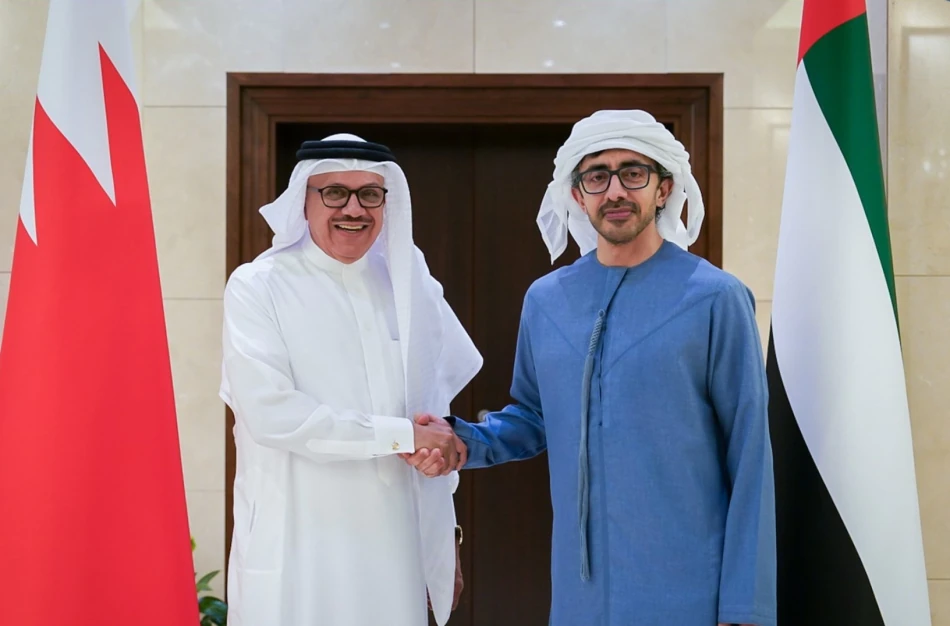
UAE's FM Receives Bahrain Counterpart, Discusses Brotherly Ties
UAE and Bahrain Strengthen Strategic Partnership Amid Regional Turbulence
The UAE and Bahrain are deepening their bilateral cooperation as regional tensions reshape Middle Eastern geopolitics, with foreign ministers from both nations meeting in Abu Dhabi to discuss enhanced economic partnerships and coordinated responses to regional security challenges. The high-level diplomatic engagement underscores how Gulf states are leveraging closer ties to navigate an increasingly complex regional landscape.
High-Level Diplomatic Engagement in Abu Dhabi
Sheikh Abdullah bin Zayed Al Nahyan, UAE Deputy Prime Minister and Foreign Minister, hosted Dr. Abdullatif bin Rashid Al Zayani, Bahrain's Foreign Minister, for strategic discussions focused on expanding the already robust relationship between the two Gulf neighbors. The meeting, attended by senior UAE officials including Minister of State Khalifa Shaheen Al Marar and economic affairs specialist Saeed Mubarak Al Hajeri, signals the priority both nations place on bilateral cooperation.
The discussions centered on shared developmental priorities and mechanisms to enhance prosperity for both populations, reflecting a broader Gulf trend toward economic diversification and regional integration that has accelerated since the 2014-2016 oil price collapse.
Strategic Context: Gulf Unity in Uncertain Times
Regional Security Imperatives
The timing of this diplomatic engagement is significant, occurring as the Middle East faces multiple security challenges including ongoing tensions with Iran, the evolving situation in Gaza, and broader concerns about regional stability. Both UAE and Bahrain have positioned themselves as moderate voices advocating for peace and stability while maintaining strong security partnerships with Western allies.
The ministers specifically addressed current regional developments and their implications for international peace and security, suggesting coordinated approaches to crisis management that have become hallmarks of UAE-Bahrain cooperation.
Economic Integration Advantages
From an economic perspective, the UAE-Bahrain partnership offers compelling advantages for both nations. The UAE's position as a regional financial and logistics hub complements Bahrain's established banking sector and growing fintech ecosystem. This synergy has proven particularly valuable as both countries pursue economic diversification strategies to reduce hydrocarbon dependence.
Unlike larger regional powers that sometimes compete for influence, the UAE and Bahrain have found success in complementary development approaches, with Bahrain often serving as a testing ground for financial innovations that later scale across the broader Gulf region.
Broader Gulf Cooperation Council Dynamics
This bilateral engagement reflects broader trends within the Gulf Cooperation Council, where smaller member states are increasingly coordinating policies to maximize their collective influence. The UAE-Bahrain model of cooperation contrasts with the more competitive dynamics seen between larger regional powers, offering a template for effective small-state diplomacy in a multipolar regional order.
The partnership also demonstrates how Gulf states are adapting to changing global dynamics, including shifting US engagement in the region and the need for more self-reliant security and economic frameworks. Both nations have successfully navigated recent regional crises, including the 2017-2021 Qatar blockade, by maintaining flexible diplomatic approaches while deepening bilateral ties.
Investment and Market Implications
For regional markets, continued UAE-Bahrain cooperation suggests stability in cross-border investment flows and regulatory coordination, particularly in financial services and emerging technology sectors. The partnership's emphasis on shared developmental priorities likely encompasses ongoing collaboration in renewable energy, digital transformation, and tourism development.
The diplomatic momentum also indicates potential for expanded infrastructure connectivity projects, building on existing initiatives like the King Fahd Causeway connecting Bahrain to Saudi Arabia, with possible extensions to facilitate UAE-Bahrain trade flows.
Most Viewed News

 Sara Khaled
Sara Khaled






